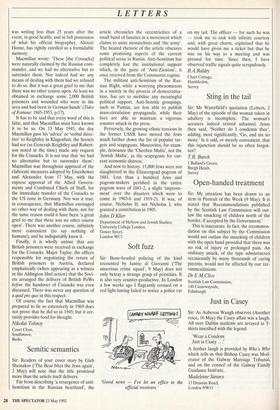Semitic semantics
Sir: Readers of your cover story by Gleb Shestakov (`The Bear bites the Jews again', 2 May) will note that the title promised more than the article itself delivers.
Far from describing 'a resurgence of anti- Semitism in the Russian heartland', the article chronicles the eccentricities of a small band of fanatics in a movement which claims to unite monarchists and 'the army'. The heated rhetoric of the article obscures some promising aspects of the current political scene in Russia. Anti-Semitism has completely lost the institutional support which, in the guise of 'Anti-Zionism', it once received from the Communist regime.
The militant anti-Semitism of the Rus- sian Right, while a worrying phenomenon in a society in the process of democratisa- tion, has yet to mobilise any meaningful political support. Anti-Semitic groupings, such as Pamiat, are less able to publish mass-circulation propaganda, while their foes are able to maintain a vigorous counter-attack in the press.
Perversely, the growing ethnic tensions in the former USSR have moved the Jews much further down the list of popular tar- gets and scapegoats. Muscovites, for exam- ple, denounce the `Chechen Mafia', not the `Jewish Mafia', as the scapegoats for cur- rent economic distress.
And now to history. 15,000 Jews were not slaughtered in the Elizavetgrad pogrom of 1881. Less than a hundred Jews and pogrom-makers perished in the entire pogrom wave of 1881-2, a slight 'improve- ment' over the disasters which were to come in 1903-6 and 1919-21. It was, of course, Nicholas II, not Nicholas I, who granted a constitution in 1905.
John D Klier
Department of Hebrew and Jewish Studies, University College London, Gower Street, London WC1


































































 Previous page
Previous page